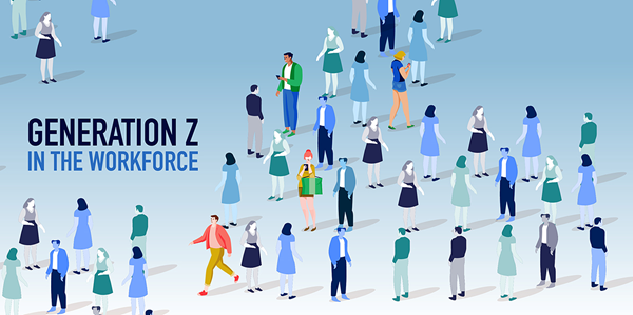1087Views

GenZ: Reimagining the role of HR
Every generation of workers has developed a distinct culture in the workplace, from baby boomers to millennials. The population is increasingly changing into a more youthful cohort, amid the sustained growth of Gen Z workers (or post-millennials). When these individuals start working for about 20 years, HR observers suggest they can affect the culture of the workplace in different ways. In the days ahead, from standardized to fluid and traditional to unconventional, this will cause a gradual change in the workplace ethos.
First let us understand what is GenZ?
Due to their internet access and community, Generation Z, the youngest of the set, are extremely perceptive and can easily see beyond corporate labels that are presumptuous. They expect to see firms follow their values passionately and stand by what they support. In attitude, Generation Z is self-motivated and entrepreneurial. They are now experienced, even more than the millennials, the generation that followed them, with uncertainties. As a result, they are searching for a meaningful job: salaries aren’t the bottom line. In comparison, they have seen the commitment of their parents and older siblings go unrewarded by bosses, so loyalty needs to be a two-way street for them. In the online world, they are digital natives who have grown up. They are advanced, and more services than ever have been gained. They seem to be outstanding networkers, which greatly increases their odds of success in anything they set their attention to.
How are GenZ different from other generations?
Competitive – Millennials are key players in the team and teamwork is of great importance. Gen Z, not that much. Even though they are willing to cooperate with others, they are still intensely competitive and excel by independently driving themselves.
Salary and security driven – Gen Z are averse to debt, and are able to work hard to guarantee financial stability, unlike millennials, most of whom are struggling under credit card and student loan debt. In order to escape student debt, many of them chose to self-educate or find unorthodox ways to study. They’re fast learners and seek knowledge; in this regard, they don’t really need hand-holding or coddling. This younger generation needs to learn aggressively to allow themselves to gain decent incomes so that their financial prospects can be strengthened.
They have no qualms about job-hopping, considering their need for protection, and can do it in a snap. Evidence reveals that Gen Z are considerably more likely than members of other groups to shift work.
How to recruit and keep workers from Gen Z?
Strengthen the recruitment strategies – Traditional recruiting strategies may not work too well for Gen Z. Companies might want to concentrate on branding themselves as a company that provides the atmosphere and advantages, they seek in the workplace in order to attract their attention. Aim to introduce more digital processes into the methods of recruiting, hiring, and onboarding.
Use mobile and applications – By incorporating mobile devices and applications into the workflow, ensure greater efficiency from Gen Z’ers. For example, forget about paper coupons, sign-in sheets and other “traditional” working flow control mechanisms. Instead, to mention a few, grant the workers access to applications and other web resources, such as automated time and attendance tracking systems, online tax calculators, and apps for project management.
Provide reviews in real-time – Like millennials, to thrive, members of Gen Z need insights. They’ll lose professionally if they worry, they’re not making it, which will contribute to the end result. Be sure to create an atmosphere where, both formally and informally, management reviews and ideas are readily communicated.
Keep incorporating flexible solutions for work – Gen Z needs a healthy lifestyle, and they will switch from work to work before they reach an atmosphere that helps them to mix work and non-work interests with their own schedules during the day (and night).
Promotional opportunities plan – They’ll move on if Gen Z doesn’t feel safe. From their present position, they need to see specific paths for development. Don’t risk wasting time and money on hiring and educating them, only seeing them jump to a rival when they thought their career direction had stagnated.
Gen Z can be expert at multitasking and, motivated by a DIY (do-it-yourself) mentality, strive effectively, proactively and pragmatically. Mobile-centred and device-savvy, they are often easy to connect and interact in real-time through several interactive networks. Managers and mentors are not an exclusive source of learning for them, but an external tool. Finally, they remain self-starters and self-learners as self-motivated people, wishing to make a speedy impact when employed. Overall, Gen Z workers’ attributes and advantages greatly outweigh their downsides, and would help to improve the organizational vibrancy and efficiency quotient.
When you move into the future, as you try to please not only millennials and Gen Z, but also Baby Boomers and Gen X employees, you’re likely to experience a challenging juggling act. You’ll find it simpler if you make the effort now to train for Gen Z when they continuously appear in the industry, as they will possibly become the main generational power in the new workplace sooner than later.
As the workforce evolves, the PGDM curriculum at Vivekanand Business School (VBS Mumbai) is designed to anticipate and align with generational shifts. With Gen Z poised to redefine workplace expectations, our Vivekanand PGDM program equips students not only with domain knowledge but also with adaptive leadership and digital fluency.
VBS emphasizes experiential learning, industry immersion, and behavioral training to prepare students for managing Gen Z dynamics—whether as peers, team leaders, or HR professionals. Students specializing in Vivekanand PGDM HR are exposed to evolving recruitment techniques, digital-first HR practices, and workplace flexibility models.
Through initiatives like summer internships with top firms, and exposure to HR conclaves, VBS students learn to decode Gen Z’s mindset and drive meaningful engagement strategies. Whether it’s building a digitally integrated HR ecosystem or promoting holistic wellness at work, our students are prepared to lead change.
At VBS Mumbai, we believe that understanding Gen Z is not just an HR function—it’s a leadership necessity. If you’re ready to shape the future of work, the journey starts here.
Yashna Bhagchandani
PGDM Batch 2020-2022
Vivekanand Business School, Mumbai


